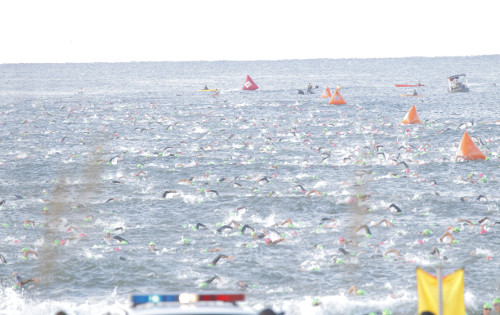Now I have always taken off the months between October and January, even slowed down on the running and biking. I would start my training in January, with running and a lot of indoor biking. The biking is where one can make up a lot of ground, running is where the race is won. So swimming, what should one do... Beginner, Intermediate, Advanced. I am not sure, from this article I am one of the 10% been swimming since birth, the past couple years I have dramatically reduced the time I have spent in the water.
TriFuel sums it up..
Swimming holds a unique space in triathlon. It’s the shortest of all three distances on race day, yet it often holds the highest level of stress. From our perspective as coaches, swimming is also the most costly training activity you can engage in. For these reasons, we strongly recommend that you implement a swimming ban in the winter and focus your swim training within the final 20-26 weeks leading up to your “A” race.
More @ TriFuel
Monday, November 25, 2013
Calf Problems, Might Not Be The Shoes!
Runners World has a great article on calf muscles cramping up and the causes.
Cramping in the calves has several causes, but the true cause is not fully understood. Your history will likely give the most clues. True muscle cramps involve intense muscle contraction and the muscle needs to be lengthened to resolve the spasm. This differs a bit from calf pain from causes other than cramping that results in muscle spasm.
Exercise-related cramps are likely caused by muscle fatigue and may involve the Golgi tendon bodies, which normally fire to inhibit the muscle from contracting too hard. If the Golgi body fatigues, the nerve input to the muscle is overstimulated and the muscle cramps. This is an oversimplified explanation of a rather complex interaction proposed in the late 90s by Martin Schwellnus from South Africa. This may also be the cause of a “Charlie horse” type of cramp that strikes in the night or when sitting with the calf in a shortened position after an exercise bout. (I used to get them on the bus ride home from away track meets.)
Tuesday, November 19, 2013
14 Workout Mistakes!
The 14 Biggest Weight-Training Mistakes
The science around strength training has changed in the last decade. You’re older, stronger, and hopefully, smarter now. Don’t make the same mistakes you made in your high school weight room.
By: GORDY MEGROZ
The bad news? There are a lot of exercises you grew up doing that are dead wrong for building power. If you want to get stronger faster, you’ll need to embrace the new science. The good news? The fixes for those old mistakes are fairly simple. We enrolled two of the country’s leading fitness experts, Rob Shaul of Mountain Athlete in Jackson Hole and Ben Bergeron of CrossFit New England, to get you back on track.
Thursday, November 14, 2013
Buyers Guide for Cyclocross
From RCUK
We’re in the midst of the cyclo-cross season: knobbly tyres, mud, cow bells, beer and frites take over from September to February.
Cyclo-cross racing is, in our opinion at least, one of the most accessible forms of competitive cycle sport, with a packed calendar of mass start, first-across-the-line-wins local league races up and down the country. MORE>>>
Friday, November 8, 2013
Ultra's, So Your Thinking Of Going Big!
Gear Patrol, really gets it right! From ramping up, to training, nutrition, etc...
An estimated 60,000 people finished an ultra in the U.S. in 2012, up from about 10,000 in 1990. That number is still small compared to the 487,000 people who completed a marathon in the U.S. in 2012, but it’s still an awful lot of people running exceptional distances. The sport has been bolstered by author-athletes like Dean Karnazes (Ultramarathon Man: Confessions of an All Night Runner), Scott Jurek (Eat and Run) and Christopher McDougall (Born to Run: A Hidden Tribe, Superathletes, and the Greatest Race the World Has Never Seen). Pros are pulling down sponsorships from serious outdoor companies like New Balance and Salomon; The North Face sponsors a series of high-profile ultra runs with growing purses and a competitive pool; mainstream media are starting to cover races. There’s a growing interest in the exceptional.
And now you’re thinking about toeing the line for an ultra. Good for you. We’ve got a handy guide to help you through, complete with advice from a few pros at the top of the sport. Here’s a preview: it’s going to be hard work, but well worth the trouble.
Subscribe to:
Comments (Atom)














